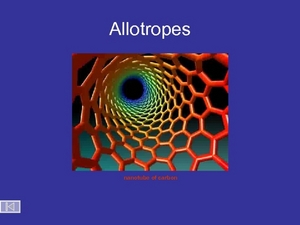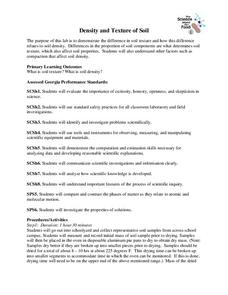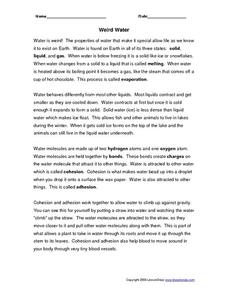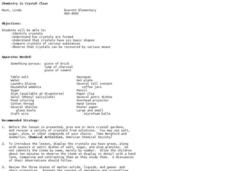Curated OER
Polymer Chemistry: More than Just Plastic
Fifth graders examine polymers and how they are formed. In this chemistry lesson plan students complete their own polymer experiment then discuss what they learned.
Curated OER
Temperature
Several slides compare different temperature scales. Thermal expansion, heat transfer, and Maxwell speed distribution are also explored. The last two slides seem unrelated to the topic of heat, but are easily left out of this otherwise...
Curated OER
Allotropes
Brilliant graphics depict a variety of allotropes, especially the allotropes of carbon. Some notes are available to help make these useful for teaching your young chemists, but not for every slide. With some additional preparation on...
Virginia Department of Education
Partial Pressure
At some point, everyone has been under pressure—even Dalton! Explore Dalton's law of partial pressures with young chemists as they measure the volume of air extracted from a sample compared to its original volume. Class...
Virginia Department of Education
Acids and Bases
What did one titration say to the other titration? We should meet at the end point! Young chemists perform four experiments: dilute solution, neutralization, titration, and figuring pH/pOH.
University of Georgia
Density and Texture of Soil
All soil is not created equal! A lab activity asks learners to collect and analyze soil. Specific calculations determine the amount of sand, silt, and clay in a sample and allow individuals to identify the soil texture.
Virginia Department of Education
Molar Volume of a Gas
What is a chemist's favorite plant? Stoichiome Tree! Scholars produce hydrogen gas by reacting magnesium with hydrochloric acid. Then they calculate the molar volume of the gas produced before answering assessment questions.
Curated OER
Liquids Have Differnt Viscosities
Young scholars explore visosity of matter. They run tests of various liquid substances to observe and compare rates of flow of different substances. In addition, they relate viscosity to distance travelled by sample substances.
Curated OER
Mass vs. Weight
Why do you weigh more in space? Each individual in your class explores this question and others as they determine the mass and weight of different objects using two types of scales. They perform conversions and discuss their...
Normal Community High School
Crystalline Structure
Cubic crystals can have 6, 8, and even 12 sides. Here is a presentation that shows pupils three different kinds of cubic crystalline structures: cubic, body-centered, and face-centered. These structures are then applied to three...
Curated OER
Petroleum Chemistry
For this petroleum chemistry worksheet, learners review hydrocarbons which includes petroleum. Students understand the properties of petroleum and where it is found. This worksheet has 12 words in a crossword puzzle, 6 fill in the blank,...
Virginia Department of Education
Solution Concentrations
What happens when you combine 6.022 times 10 to the 23 piles of dirt into one? You make a mountain out of a mole hill. Scholars use dehydration to obtain percent composition and then calculate the molarity of the original...
Curated OER
Activity #9 A State Debate!
Students list individual properties of solids, liquids, and gases. They examine that some properties have more than one state of matter. Pupils consider whether shaving cream, is a solid, a liquid, or a gas, or some combination.
Curated OER
Chemical Composition of American Coins
Students investigate the chemical composition of pennies dated 1983 or later. In this chemical composition of American coins lesson plan, students scratch the surface of the penny to expose the zinc core. They put the penny in...
Curated OER
Household Chemistry
Learners use indicator paper to determine if substances are acidic, basic, or neutral. They test for Ph levels in them. They investigate the effect of oxygen on darkening fruit cut and exposed to the air. They observe vitamin C as an...
Curated OER
Weird Water
For this weird water worksheet, students read for information and assess comprehension. In this true and false, fill in the blank, and multiple choice worksheet, students answer ten questions.
Curated OER
Chemistry is Crystal Clear
Students observe crystals and their shapes and formation. In this crystal formation lesson, the teacher prepares crystal gardens for the students to observe, then the class finds examples of crystals in nature and observe a teacher...
Curated OER
Crash Test Dummies
Fifth graders are introduced to Newton's First Law of Motion. In groups, they describe the differences between balanced and unbalanced forces. They participate in experiments that demonstrate how equal and opposite forces act upon...
Curated OER
Volume Lab
How can we find volume if it a shape isn't easy to measure? Investigate methods for determining this as the volume of regular and irregular objects is explored in several stations. Learners discover that when the standard formula for...
Curated OER
What Can We Do To Change These Materials
First graders perform experiments to investigate property changes that occur in materials or matter. In the science lab, they use heat to explore changes in rice, sand, gelatin, baking soda and more. Learners observe and record the...
Curated OER
The Structure of Materials
Students brainstorm what matter is and how they define it. They construct a water molecule with marshmallows and toothpicks. In addition, they watch videos to explore the use the idea of nanoscience to investigate the properties of...
Curated OER
Poster Assignment: Sports Chemistry
Tenth graders distinguish between chemical and physical properties and changes in matter when given specific examples. They view a video of sports activities. Students chose their favorite sport and design an experiment to improve sports...
Curated OER
Floating Soap
Students explore the density of soap. In this science lesson, students conduct an experiment to find which types of soap will float. Students make a hypothesis and record their observations.
Curated OER
Permafrost: Permanently Frozen Ground
Students explore permafrost. In this 3 states of matter lesson plan, students identify characteristics of solids and liquids. Students observe water and soil melting and freezing at various temperatures. Students make...

























